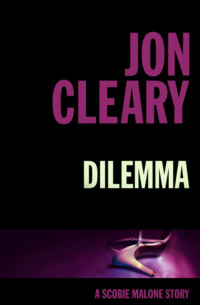
Полная версия
Winter Chill
‘She’ll survive.’ He would never forgive God if she didn’t.
Having unburdened himself to Clements didn’t help, but somehow he got through the rest of the day. One of the five murders on the calendar was suddenly cleared up with a confession, releasing Andy Graham and John Kagal; he sent Graham to follow up with Phil Truach on the Brame case. Peta Smith was sent out to ABS Security and John Kagal went with her. Just before four o’clock all four detectives reported back to him. There was no room for all of them, plus Clements, in Malone’s office, so they repaired to the big main room.
‘We could do with some coffee,’ he said. Nobody moved, then he remarked that the four men were looking at Peta Smith.
She remarked it, too. ‘The tea-lady’s gone home. You want me to run after her?’
For a moment Malone was irritated; after all, he hadn’t nominated her. Then he nodded to Kagal. ‘You’re nearest the kettle, John, okay?’
Kagal had the grace to smile as he stood up. ‘Are you ever going to make a cuppa, Peta?’
‘Not while it’s taken for granted that I will,’ she said, unsmiling. ‘No milk in mine, thanks.’
‘Sugar?’
‘Call me sweetheart, not sugar. One lump.’ Then she looked around the other men, Malone included. ‘You’ll learn. It may take a year or two, but you’ll learn. Sir,’ she said, addressing Malone.
He grinned, the only way out other than being bloody-minded. ‘If I start a roster for coffee-making, you mind if I put your name on it? … Righto, what’ve you got for me?’
She gave him a grin in return; she was not a shrew. ‘John and I went out to ABS, got Murray Rockman’s file.’ She handed it to Malone. ‘Then we went out to the block of units where he lived in Arncliffe. One of the neighbours, a stickybeak – I’d hate to live next door to her – she said Rockman had had a girl living with him, but she’d left him about three months ago. He’s lived alone since then, except for the odd weekend girl. The old biddy next door didn’t miss a trick. His keys were in his locker at ABS, we’d taken those, so we let ourselves in. We found nothing, nothing but his clothes.’
She stopped and Malone said, ‘You’re going to tell us something, right?’
Kagal came back with the office tin of biscuits. Peta Smith looked at him. ‘You want to tell them?’
‘I’m making the coffee,’ he said, but grinned at her.
‘Bastard … Like I said, there was nothing in the flat but his clothes. No papers, no address book, no passport, nothing that might identify him – zilch. Either he’d cleaned everything out himself or someone had got there before we did.’
‘The stickybeak neighbour saw nothing?’
‘She said she’d been out shopping this morning, wanted to give us a rundown on where she’d been.’
‘Any sign of forced entry?’
‘None,’ said Kagal, coming back with the tray of coffee cups. ‘All we have of Mr Rockman is what’s in his file.’
Malone opened the file. Two pages: but then he wondered how many of the world’s voters and non-voters merited any more than two pages. Some lives, he knew, could be written on the back of an envelope and a small one at that. He had no conceit that his own life would warrant any more than a few pages and half of those would concern the deaths of other people. ‘Born Caswell, Ohio, August 22, 1960. High school education … Blah, blah, blah … US Marine Corps, 1980–1983 … He told me yesterday he’d been out here twelve years. He must’ve come here straight after leaving the Marines. The file doesn’t tell us much. The second page is just a resumé of his references. They all look okay.’ He closed the file. ‘But what sort of life did he live when he wasn’t working for ABS? You checked if he has any record?’
‘I’ll do that now,’ said Peta Smith and rose and moved across to one of the computers.
Malone sipped his coffee. ‘Nice coffee, John. Your first attempt?’
Kagal raised his cup. ‘Okay, make out a roster. Equality above all.’
‘Don’t let Peta hear you say that.’
Kagal smiled, drank his coffee. He was a good-looking young man, the best dressed of all the detectives, some of whom, in Malone’s old-fashioned opinion, were real dudes. Kagal would never have any difficulty getting women’s attention and perhaps even their devotion. His only fault, again in Malone’s opinion, was that he thought he deserved everything that was offered him.
Peta Smith came back, picked up her cup and tasted it. ‘Nice cuppa, John … Mr Rockman has no record. He’s spotless.’
‘He’s bloody near invisible,’ said Malone. ‘Andy, you’re the man with the contacts in the FBI. Get on to ’em, ask if they’ll trace him for us. See what they have on him, if anything. At least there’ll be his Marines record.’
Andy Graham sprang to his feet, spilling his coffee but managing not to splash any of it on his clothes. He went through life at a gallop, never in front, always trying to catch up. He grabbed Rockman’s file from the table and was gone. All the others smiled at each other but said nothing. Andy Graham was lovable in his absence.
Malone turned to Clements. ‘Anything yet from Ballistics on Brame?’
‘Just come in.’ Clements dropped a plastic envelope on the table. ‘Clarrie Binyan says it’s an uncommon one, not the usual calibre. It’s a nine-millimetre ultra. Clarrie’s trying to trace the sort of gun that would take it.’
‘Righto, your turn, Phil. How’d you go?’
Truach sighed, coughed. ‘You ever tried to interview a thousand lawyers? You get a thousand opinions. The gist of it all, however, was that nobody saw nothing. One or two, the vice-president for one, Zoehrer, they do remember seeing Brame talking to someone in the coffee lounge Sunday night. A waitress remembered they walked out together, Brame and the other guy. She says she didn’t look at the other man, she was looking at Brame, she’d been told he was the boss cocky and she was observing what a top man looks like. Seems she wants to be a writer, she’s taking some writing course.’
‘So she doesn’t look at the supporting character?’ said Peta Smith. ‘She must write poetry.’
All the men, poetry lovers if ever one saw a bunch of them, nodded. Malone wondered if, between the lot of them, they could recite the first half a dozen lines from The Man from Snowy River. ‘Did you get to see Mrs Brame, Phil?’
Truach was bouncing an unlit cigarette up and down on his palm, a hint that he was dying for a smoke; Malone ignored it. ‘She was out, they told me. Making arrangements to fly her husband’s body back to the States as soon’s it’s released. Seems it’s harder to book a ticket for a coffin than for a livin’, breathin’ person.’
Clements ferreted in his trivia bag: ‘D’you know that if someone kicks the bucket on an aircraft, they just throw a sheet over him and leave him in his seat? There’s nowhere to put a stiff. How’d you like that, sitting beside a corpse when they serve you lunch?’
Malone glanced at Peta Smith to see how she was taking the deadpan macho humour, but she seemed unperturbed by it. He turned back to Truach. ‘There’s a brother here. Did anyone mention him to you?’
‘No.’
‘Russ, you and I’d better have a talk with the brother, what’s-his-name?’
‘Channing. Their offices are down in Martin Place. I looked it up.’
‘I thought you might have.’ He rose, looked at his watch. He wanted to go home, to be with Lisa, but she had said, Do your job. He would do it, as conscientiously as ever, but only because she had insisted. He was beginning to realize that she had run his life far better than he could have alone. ‘We’re always hearing about how late lawyers have to work. Let’s go and see. Thanks for the coffee, John.’
‘Any time,’ said Kagal, ‘the roster says so.’
‘You’re learning,’ said Peta Smith and winked at Malone. He felt almost affectionate towards her as he walked out of the office.
2
‘Let’s walk,’ he said when he and Clements were outside the Hat Factory. The rain clouds had gone and the late-afternoon sky looked like blue ice. The wind still blew, ambushing them at corners, snatching like a mad joker at hats and umbrellas. Malone, looking for something to lighten his mood, was reminded of the old joke of the bald man whose hair was blowing in the wind and he was too embarrassed to run after it. Clements had said nothing when walking was suggested, but now he looked at Malone as the latter smiled.
‘Something funny?’ Malone told him the joke and Clements went on, ‘Keep laughing, that’ll be the trick. Well, not laughing, but keep your spirits up.’
‘Don’t play counsellor with me, Russ.’ Then he heard the abruptness in his voice. ‘Sorry. I’m touchy, I’m still getting used to what’s happened to her.’
‘I understand, mate. But like I say, be optimistic. Don’t be so bloody Irish.’
The walk along Elizabeth Street took them just over ten minutes. Over on their right Hyde Park was dark and dank, wrecked by winter. They passed the huge Park Grand hotel, repossessed within a year of its opening but now, fortunately, chockablock with lawyers; they glanced in, saw the packed lobby and hurried past as if afraid of being bombed with torts. As they passed David Jones, a door of the big department store opened and they heard the music: the pianist threw a few bars at them, memories were made of this and that, then the door closed again. As they reached Martin Place the street-lights came on and the clock on the GPO tower struck a quarter to five. The Channing and Lazarus offices were in one of the older buildings on the north side of the long narrow plaza.
The offices had been newly furnished, suggesting Channing and Lazarus might have been celebrating a good financial year. There were new beige carpet and tub chairs and a couch in a muted deep purple tweed; on the cream walls there were large brass-framed prints of several of the more restrained modern Australian paintings, no invitatory genitals or phallic flagpoles. The girl behind the modern teak desk, getting herself ready to leave, was as smart as the paintings, though perhaps a little more invitatory. At least she was spraying a musky perfume behind her ears as the two detectives walked in.
‘Mr Channing?’ She looked at them in surprise. ‘Did you have an appointment?’ Clements showed his badge and she looked even more surprised. ‘Oh. I’ll see if he’s free.’
Rodney Channing was free, though he did not appear too glad to see them. He stood up as Malone and Clements were shown into his office. This, too, had been newly refurbished, but it was all leather, though not club-like. There were two paintings on the cream walls, one a landscape by Lloyd Rees, all airy light, the other a portrait of Channing in a style that Malone thought had died years ago. Rodney Channing, at least in the portrait, looked mid-Victorian, stern and forbidding, and Malone wondered why he had chosen to be painted that way.
‘My brother?’ Channing said when Malone explained the reason for their visit. ‘We’ve been strangers to each other for thirty years.’
‘We understand he was seen talking to a stranger Sunday night in the coffee lounge of the Novotel hotel. Was it you?’
‘Sunday night? No, no it wasn’t.’ There was a pause, then he seemed to relax; or at least accept that the detectives were here to stay. He sat down behind his desk, gestured to them. ‘Sit down. I saw my brother Sunday morning. He came here to my office.’
‘Here? Sunday morning?’
There was a pause again: Channing seemed to be laying his words out like playing cards. ‘I told you, we were strangers. I – I suggested here because I wanted to be sure we’d get on together, after so long. I didn’t want to invite him to my home and have an awkward situation in front of my wife and family. I have three children, all youngish.’
‘And did you? Get on together?’
Another pause. ‘Not exactly. The separation, I suppose, had been too long.’ Then there was a knock at the door and a woman put her head inside the room. ‘Oh June! Come on in. This is Mrs Johns, our office manager.’
June Johns had been born to manage; one look at her told you that. She was in her late thirties, attractive, a little plump, wearing a blonde helmet of hair; but it was her manner, her wouldn’t-miss-a-detail eyes, that caught the attention. Her smile would have cowed a stampede of bulls.
She shook hands with the two detectives, a firm handshake that let them know she wasn’t cowed by them. ‘Are we being investigated or something?’ Her smile suggested that they had better not be. ‘Law firms seem to have been in a lot of trouble over the past year. Other firms.’
‘These gentlemen are from Homicide,’ said Channing. ‘They are investigating my – my brother’s murder.’
‘Oh? Any luck?’
Clements, the punter, thought she might have been asking if he had backed a winner at Randwick. ‘Not so far. But it’s early days—’
She turned away from him, looked at Channing. Malone had no idea of the ranking in a law firm, but he guessed that an office manager would have much less status than a partner, particularly one of the two senior partners. Yet Mrs Johns gave the impression that her status did not matter, at least not to her. Though she did call him – ‘Mr Channing. Is there anything we can do to help?’
‘We?’ Channing fumbled one of the cards; or anyway, a word. ‘How?’
‘I don’t know.’ She looked back at Malone and Clements; she appeared to have taken command. ‘Perhaps you gentlemen can tell us?’
Malone didn’t answer her, just turned back to Channing. ‘You never represented your brother’s firm out here?’
Channing shook his head. ‘We do represent three or four American firms, but never Schuyler, De Vries and Barrymore. I’m afraid we’re too small to have interested them.’
‘How big are you?’ asked Clements.
‘Forty all told,’ said Mrs Johns. ‘Two senior partners, four junior partners, six legal staff. And then the usual office staff, including myself. Nothing compared to Schuyler and partners. They’re a small army.’
Malone wondered why and how the manager of a medium-sized Sydney law firm would know how big a major New York firm was. But maybe law-firm office managers, like defence chiefs, kept tabs on other armies. ‘Would you know if Schuyler et cetera had links with other law firms in Sydney?’
‘Oh, they’re sure to have had.’ Channing had risen to his feet when Mrs Johns had come in, but Malone and Clements had resumed their seats after greeting her. Channing looked as if he didn’t want the meeting prolonged, but Malone was going to take his own time. ‘But it’d be one of the big firms—’
‘One of the small armies.’ Mrs Johns made what sounded like a soft hissing noise, but Malone thought he could have been mistaken. There was no doubt, however, that she did not have much time for battalions of lawyers. ‘We can check for you—’
‘We’ll do that,’ said Malone, who did not like being managed and felt that Mrs Johns was cracking her office whip. ‘We’re investigating another murder down at Darling Harbour. It may or may not be connected with your brother’s murder, Mr Channing.’
‘Another lawyer? Someone from his firm?’ Channing, with both hands on his desk, leaned forward: like a prosecutor quizzing a witness was the image that struck Malone.
‘You knew someone from Schuylers was with your brother?’
‘Well, no. I don’t know why I – I asked that.’
He was standing in front of the painting of himself; Malone, a modest man, wondered at the vanity of someone who would seat himself in front of his own portrait. But there was the stiff, formal Rodney Channing gazing over the shoulder of the suddenly ill-at-ease real Channing. Then Malone knew that the portrait was Channing’s own impression, not the artist’s, of himself. It was intended to impress clients that the real Rodney Channing was the calm, solid man in the painting.
‘No, it wasn’t anyone from Schuylers. He’s still alive, a young man named Adam Tallis. No, it was a security guard who was murdered. The same one who found your brother’s body.’
‘Coincidence?’ asked Mrs Johns.
Malone had been looking at Channing, who had leaned forward on the desk again, frowning this time but saying nothing. Then Clements said, ‘We’re looking into that, Mrs Johns. We’re not great believers in coincidence in the Police Service.’
Speak for yourself, thought Malone. He believed that coincidence greased the wheels of the world, otherwise fate would go off the track. The Celt in him wasn’t entirely negative.
‘A security guard?’ Channing had straightened up again. ‘What would he have to do with my brother?’
‘We’re not even trying to guess at this stage,’ said Malone. ‘Except that the security guard, too, was an American.’
Then the door, which was half-open, was pushed wide and another woman stood there, dressed for an evening out and holding a man’s white shirt on a hanger. ‘Oh, I thought … I’ll wait outside.’
‘No, come on in, come on in!’ Channing moved swiftly round the desk, advanced on the woman and hugged her as if she were a client on whom the future of Channing and Lazarus depended; she could not have been more welcome if she had been Alan Bond or Christopher Skase back in their heyday. He took the shirt from her, introduced her to Malone and Clements. ‘My wife Ruth. These gentlemen are from the police, they’re investigating my brother’s murder, they’re just leaving … My wife and I have to go to a reception for the Americans, the Bar Association. The Law Society is putting it on …’ Words were tumbling out of him, he was like a card trickster whose fingers had turned into fists. ‘I have to change …’ He held up the shirt. ‘If you’ll excuse me?’
‘You go and change, sweetheart.’ Mrs Channing stepped aside and pushed her husband out the door. ‘We’re running late. June and I will show the gentlemen out. I’m one of the official hostesses,’ she explained to the two gentlemen. ‘I can’t afford to be late.’
Ruth Channing had escaped plainness with the aid of a hairdresser, an aerobics instructor and a couturier, the latterday fairy princes who, for a price, would kiss any plain jane or joe for that matter. There was also a vivacity that lit up her small pale eyes, that gave mobility to her thin lips. Malone guessed she would be a willing volunteer hostess, anything to advance her husband’s career, one hand in the middle of his back guiding him. It struck Malone that, between his wife and Mrs Johns, Channing’s kidneys might be black and blue from being steered in the right direction.
‘I don’t know why, I’m expecting all these Americans to look like Perry Mason. I have this crazy sense of humour—’ She was one of those people who, afraid that the rest of the world was too dumb to be perceptive, would always help them with a description of her imagined better qualities. It was Malone’s experience that those who claimed a crazy sense of humour often had no such thing if the joke was against them. ‘It’ll be the social death of me one day—’
And a sickness for your friends: Malone wondered why he felt so unkindly towards Mrs Channing. Then realized he had let Channing and Mrs Johns start the irritation. ‘We must be going,’ he said.
‘Murder won’t wait, will it?’ she said.
He stopped dead. ‘Pardon?’
‘Didn’t Perry Mason say that? Or was it Shakespeare?’
Then he recognized the brightness in the pale eyes, the width of the smile: she was high on some drug. He had read her wrongly. She was not a volunteer hostess; the pushing hand was in her back. There were wives like her everywhere, driven or pulled by their husbands into situations where they would always be off-balance, where they would have to fall back on some support they could not find in themselves. The portrait on the wall must forever mock the Channings. Malone wondered what the other partner, Lazarus, was like.
‘Oh, murder will wait, Mrs Channing. We’re very patient in Homicide.’
Her eyes widened, as if she had realized that, for him, murder was no joke. Then Mrs Johns stepped forward, took her arm. ‘I don’t think we need any more of this sort of talk. Show yourselves out, will you, Inspector?’
‘Of course. We’re used to doing that.’ She gave him a look as sour as the note in his voice. ‘Channing and Lazarus. Is there a Mr Lazarus?’
Mrs Johns paused in the doorway. ‘Yes, Mr Will Lazarus. He’s overseas at the moment.’
‘America?’
‘No, Europe. Excuse us. Will you be coming again?’
Malone shrugged. ‘Who knows?’
‘Telephone first.’ Then she was gone, her hand in Mrs Channing’s back.
Out in Martin Place the wind was still blowing; the evening was turning bitterly cold. Banners on the flagpoles lining the plaza crackled in the wind; they writhed so much it was impossible to tell what occasion was being celebrated. Malone looked up and down the slight slope of the plaza. It had the potential to rival some of the plazas of Europe, but it was cluttered. Give an Aussie planner an open space, he thought, and it would soon be filled up. He was waiting for the planners to be let loose on the vast Nullabor Plain in the interior. He and Clements walked up the slope under the winter-shredded trees.
‘What d’you reckon?’
‘Something smells,’ said Clements. ‘There’s a connection.’
‘Between the murders?’
‘I dunno about them. No, between Channing and Brame, the two brothers. Maybe we should’ve tried to get more out of Mrs Channing.’
‘She was up to her eyeballs on something. What sort of drugs do nice housewives take, women who don’t want to be anything but housewives?’
Above their heads a banner crackled like a burst of machine-gun fire. The wind threw a handful of grit against their faces and they had to shut their eyes; a few leaves scurried after them like blind mice. ‘She’s probably on one of the designer drugs. You look at her? Everything about her is “designer”. So’s he. Between ’em they’d be wearing more logos than Nigel Mansell. Whatever she’s snorting, it’s still shit.’ Clements had a hatred of drugs and contempt for those who advocated their legalization. He would press his argument over any number of beers. ‘Half an hour with her and if she knows anything, we’d have it out of her.’
Malone shook his head, grabbed at his hat as the wind tried to rob him of it. ‘Mrs Johns would never let us near her, not for that long.’
Clements looked sideways at him, eyes slitted against another burst of grit. ‘I’d like half an hour with that woman.’
‘You’d have to put a gun at her head. That woman wouldn’t be able to remember the last secret she gave away.’
3
Romy was just leaving the Malone house when Scobie arrived home. He took her out to her car, opened the door for her when she had unlocked it. ‘How was Lisa with you?’
‘Sensible. She’s worried, but more for you and the children than for herself. Wives and mothers usually are, good ones.’
He nodded; he had seen it too many times, in other homes. ‘What are the chances?’
‘Of recovery? Good. They won’t really know till surgery, but if they have caught it early, if it’s localized …’ She put her hand on his. The wind had dropped while he had been driving home and the cold now had the night to itself; the roof of the car was almost freezing his palm. ‘There’ll be chemotherapy …’
‘That knocks you around, doesn’t it?’
‘Scobie, don’t think about the worst. Be optimistic.’
‘That’s what Russ told me.’ He kissed her cheek. The two men loved each other’s wives: it was another bond between himself and Clements. ‘Was it you who did the autopsy on the American, Brame?’
‘Yes. A gunshot wound, right through the heart. A close shot, there were powder marks on the chest. Most people are not quite sure where the heart is, but this killer knew exactly. One bullet – Ballistics have it.’
‘Are you doing the autopsy on the other bloke who came in this morning?’
‘Scobie love—’ She smiled. ‘We had six other blokes this morning and five women. Not all homicides—’
‘Not all of them with a bullet in the head.’ Homicide made you parochial about death. Then he looked around him at the night.
‘What’s the matter?’









